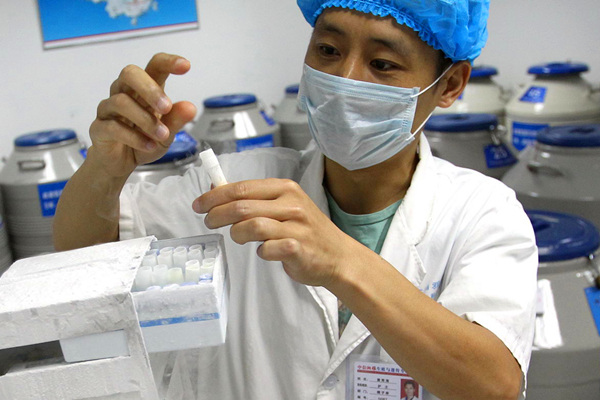
Sperm banks in China, like this one in Changsha, Hunan province, are seeing an increase in the number of visits by infertile couples. (Photo: China Daily/Zhang Wei)
As an increasing number of couples, many past their reproductive prime, seek to have a second child under China's new two-child policy, challenges exist including poor sperm quality, experts said.
According to official estimates, 60 percent of the couples who are newly eligible for a second baby are age 35 or older, and many of these are visiting fertility specialists for advice or assistance.
Physician Long Wen, who works for the fertility center of Renmin Hospital of Wuhan University in Hubei province, said that more than half of his male patients had "substandard" sperm quality.
Long said he usually sees about 80 visitors a day, and that his check involves sperm quantity and quality in the semen.
The revelation came as China's State Council issued a resolution on Tuesday on implementing the universal two-child policy and improving family planning services to carry out the new law.
The Cabinet-level document aims to set up an overall support system for families with two children, as encouraged in the amendment to the nation's Law on Population and Family Planning, which was approved by the top legislature on Dec 27.
The resolution stipulates that the past family planning policy, which limited most Chinese couples to one child, was in line with the nation's practical situation at the time.
It calls for streamlining the administrative procedures related to reproduction and optimizing the distribution of public services and resources, such as child and maternity healthcare, child nursing, primary and middle schools and related social welfare programs.
Additionally, it urges enhancement of reproductive health services to cover the whole process of childbirth, the training of more skilled obstetricians, midwives and pediatricians, and development of new technologies.
There solution also calls for equal access to family planning services, particularly for the migrant population.
Meanwhile, Long said that less than 30 percent of the males age 40 and older who consulted him had quality sperm. Those working in the fields of information technology and the media were most susceptible to low quality, mainly due to lifestyles of little exercise, sitting for long periods, a heavy workload and smoking, he said.
The number of those consulting him who want a second baby has increased substantially after the policy change, and half of the mare at least 40 years old, Long said.
Those 35 or older are at elevated risk of infertility and pregnancy complications, medical experts warned, saying that the reproductive prime is from ages 24 to 28.
Zhang Zhichao, head of the Andrology Center at Peking University First Hospital, agreed and said he saw a number of people in their 50s seeking a second child.
Theoretically, men's fertility, mainly measured by sperm quality, would last at least into their 50s, but "in reality, many have a problem with that even in their 30s," he said.
Some existing conditions like varicosity affect male fertility as well, he added. "It's important for the couples to go through related fertility checkups beforehand."
"My first question for those older than 50 would be how old is your wife," he said, urging couples who no longer are young to be cautious about any birth plan.
He said that if the wife is past 40, he would recommend against pursuing another child, saying that fertility declines for men and women alike as they age.
Qin Lang, a physician at the Reproductive Medical Center of the West China Second University Hospital in Chengdu, Sichuan province, said that among all the couples age 30 and older who consulted him, more than half of the men had substandard sperm quality.
Despite the lack of a national survey on sperm quality, China has seen an increasing reproduction problem, with the infertile population exceeding 50 million. Half involve infertile husbands with low sperm quality, according to official estimates.


















































